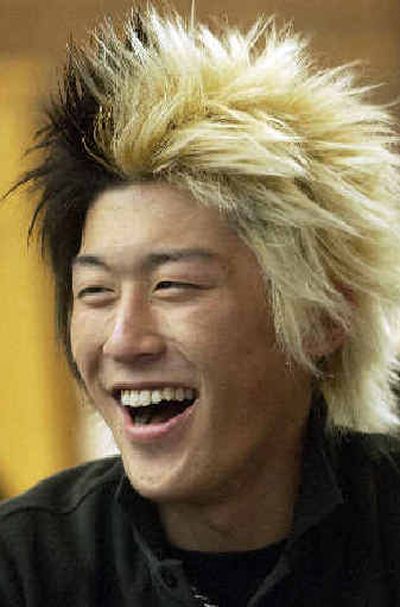Japanese students like freedoms

The left side of his frizzy black hair is bleached white. Zippers and metal studs accessorize his tight black pants. A skull-and-crossbones logo covers his Pink Dragon punk band shirt.
It’s easy to spot Takuma Iwashita, 19, as he takes a break between classes at the Pence Union Building at Eastern Washington University. He sits at a table and goofs with his friends, some 5,000 miles from his university in Tokyo.
Iwashita is among the evolving group of young Japanese who’ve embraced a more Western mind-set of independence, pop culture and social freedom, something that’s become more common in recent years.
Currently, 88 college students from the Asia University American Program based in Tokyo are in their last weeks of a five-month study-abroad program at EWU. The Asia University program has been placing students at Western Washington University, Central Washington University and EWU since 1989. Another full group of about 90 students will attend EWU classes in the fall.
Through the years, Japan’s students have become, well, more American.
“They’re just a lot more open about themselves than I saw in the beginning,” said Evelyn Renshaw, curriculum director of the program.
About half the students mingle around campus with standard student wear of jeans and T-shirts, but some like Iwashita push the norms.
“Japanese people don’t like this style,” Iwashita said. “Japanese students have changed from 10 years ago. We have more freedom. We can try anything.”
Iwashita said he wants people to know he’s a little different from the rest.
On July 20, Iwashita’s punk band will play Green Day songs and Japanese punk rock at an evening talent show set up for his peers outside in the EWU courtyard.
Despite his showy appearance, Iwashita said he’s from a small town outside Tokyo and he prefers rural life.
“I like quiet. I don’t like crowded towns,” Iwashita said.
One of his classmates, Miho Kurosawa, 20, said she is nervous about going back home to the busy life of Japan that can be cold because strangers don’t talk and rarely make eye contact.
“When I take the bus here, the driver talks with the passengers. They are very friendly,” Kurosawa said.
At first, life in Cheney felt odd because strangers started conversations with her, she said. Kurosawa and her classmates talked among themselves about how chatty everyone was around town, which was unnerving at first.
In Japan, where open space is rare and public facilities are crowded, people learn to develop a sense of privacy even in the most crowded areas, Renshaw said.
Cheney’s helped change that sensibility in Kurosawa, who now makes it a point to smile at Americans she catches looking toward the group of Japanese students.
“Americans think about Japanese as very shy, strict and serious,” she said. “Most of my friends and myself are not so shy.”
Kurosawa’s convinced she wants to come back one day and further her studies in America. Her dream job is working with underdeveloped nations in Asia.
Her father works for a construction company that builds basements in Japan. She often calls home with her latest adventures.
During the five-month session, two weeks are left open when students are encouraged to travel around the country. They must make all their own travel arrangements.
Many times, they befriend a student adviser from the residence halls so they get to visit the hometowns of American students and experience home-cooked American food, Renshaw said. A number of students made the trip to Seattle to see Japan’s Michael Jordan, Ichiro Suzuki, who plays for the Seattle Mariners.
The idea is to allow them to get a much deeper understanding of American culture and language through interaction.
Kurosawa impressed Renshaw by volunteering her time at the Humane Society during her five-month stay.
No one told her about the groups that help dogs and cats, Renshaw said. No one organized it, she did it on her own – proof again of the emerging streak of Japanese independence.